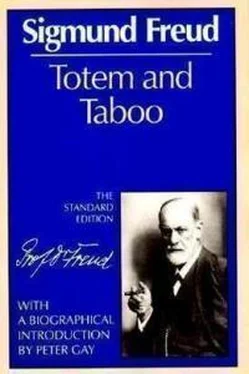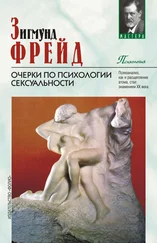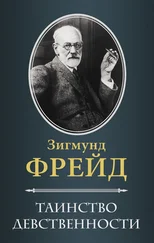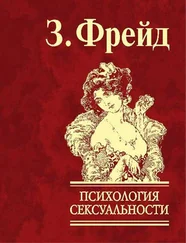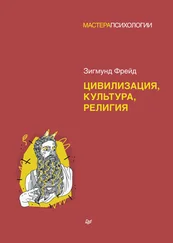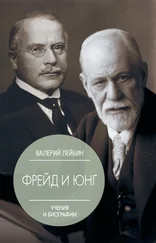Зигмунд Фрейд - Totem and Taboo
Здесь есть возможность читать онлайн «Зигмунд Фрейд - Totem and Taboo» весь текст электронной книги совершенно бесплатно (целиком полную версию без сокращений). В некоторых случаях можно слушать аудио, скачать через торрент в формате fb2 и присутствует краткое содержание. Год выпуска: 2014, Издательство: epubBooks Classics, Жанр: Психология, на английском языке. Описание произведения, (предисловие) а так же отзывы посетителей доступны на портале библиотеки ЛибКат.
- Название:Totem and Taboo
- Автор:
- Издательство:epubBooks Classics
- Жанр:
- Год:2014
- ISBN:нет данных
- Рейтинг книги:3 / 5. Голосов: 1
-
Избранное:Добавить в избранное
- Отзывы:
-
Ваша оценка:
- 60
- 1
- 2
- 3
- 4
- 5
Totem and Taboo: краткое содержание, описание и аннотация
Предлагаем к чтению аннотацию, описание, краткое содержание или предисловие (зависит от того, что написал сам автор книги «Totem and Taboo»). Если вы не нашли необходимую информацию о книге — напишите в комментариях, мы постараемся отыскать её.
Totem and Taboo — читать онлайн бесплатно полную книгу (весь текст) целиком
Ниже представлен текст книги, разбитый по страницам. Система сохранения места последней прочитанной страницы, позволяет с удобством читать онлайн бесплатно книгу «Totem and Taboo», без необходимости каждый раз заново искать на чём Вы остановились. Поставьте закладку, и сможете в любой момент перейти на страницу, на которой закончили чтение.
Интервал:
Закладка:
It seems to me very remarkable that Westermarck looks upon this innate aversion to sexual intercourse with persons with whom we have shared childhood as being at the same time a psychic representative of the biological fact that inbreeding means injury to the species. Such a biological instinct would hardly go so far astray in its psychological manifestation as to affect the companions of home and hearth which in this respect are quite harmless, instead of the blood relatives which alone are injurious to procreation. And I cannot resist citing the excellent criticism which Frazer opposes to Westermarck’s assertion. Frazer finds it incomprehensible that sexual sensibility to–day is not at all opposed to sexual intercourse with companions of the hearth and home while the dread of incest, which is said to be nothing but an offshoot of this reluctance, has nowadays grown to be so overpowering. But other remarks of Frazer’s go deeper and I set them down here in unabbreviated form because they are in essential agreement with the arguments developed in my chapter on taboo.
“It is not easy to see why any deep human instinct should need reinforcement through law. There is no law commanding men to eat and drink, or forbidding them to put their hands in the fire. Men eat and drink and keep their hands out of the fire instinctively, for fear of natural, not legal penalties, which would be entailed by violence done to these instincts. The law only forbids men to do what their instincts incline them to do; what nature itself prohibits and punishes it would be superfluous for the law to prohibit and punish. Accordingly we may always safely assume that crimes forbidden by law are crimes which many men have a natural propensity to commit. If there were no such propensity there would be no such crimes, and if no such crimes were committed, what need to forbid them? Instead of assuming therefore, from the legal prohibition of incest, that there is a natural aversion to incest we ought rather to assume that there is a natural instinct in favour of it, and that if the law represses it, it does so because civilized men have come to the conclusion that the satisfaction of these natural instincts is detrimental to the general interests of society” [182] l.c. , p. 97.
.
To this valuable argument of Frazer’s I can add that the experiences of psychoanalysis make the assumption of such an innate aversion to incestuous relations altogether impossible. They have taught, on the contrary, that the first sexual impulses of the young are regularly of an incestuous nature and that such repressed impulses play a rôle which can hardly be overestimated as the motive power of later neuroses.
The interpretation of incest dread as an innate instinct must therefore be abandoned. The same holds true of another derivation of the incest prohibition which counts many supporters, namely the assumption that primitive races very soon observed the dangers with which inbreeding threatened their race and that they therefore had decreed the incest prohibition with a conscious purpose. The objections to this attempted explanation crowd upon each other [183] Compare Durkheim, La Prohibition de l’Inceste ( L’année Sociologique , I, 1896–7).
. Not only must the prohibition of incest be older than all breeding of domestic animals from which men could derive experience of the effect of inbreeding upon the characteristics of the breed, but the harmful consequences of inbreeding are not established beyond all doubt even to–day and in man they can be shown only with difficulty. Besides, everything that we know about contemporaneous savages makes it very improbable that the thoughts of their far–removed ancestors should already have been occupied with preventing injury to their later descendants. It sounds almost ridiculous to attribute hygienic and eugenic motives such as have hardly yet found consideration in our culture, to these children of the race who lived without thought of the morrow [184] Charles Darwin says about savages: “They are not likely to reflect on distant evils to their progeny.”
.
And finally it must be pointed out that a prohibition against inbreeding as an element weakening to the race, which is imposed from practical hygienic motives, seems quite inadequate to explain the deep abhorrence which our society feels against incest. This dread of incest, as I have shown elsewhere [185] See Chapter I.
, seems to be even more active and stronger among primitive races living to–day than among the civilized.
In inquiring into the origin of incest dread it could be expected that here also there is the choice between possible explanations of a sociological, biological, and psychological nature in which the psychological motives might have to be considered as representative of biological forces. Still, in the end, one is compelled to subscribe to Frazer’s resigned statement, namely, that we do not know the origin of incest dread and do not even know how to guess at it. None of the solutions of the riddle thus far advanced seems satisfactory to us [186] “Thus the ultimate origin of exogamy and with it the law of incest—since exogamy was devised to prevent incest—remains a problem nearly as dark as ever.”— Totemism and Exogamy , I, p. 165.
.
I must mention another attempt to explain the origin of incest dread which is of an entirely different nature from those considered up to now. It might be called an historic explanation.
This attempt is associated with a hypothesis of Charles Darwin about the primal social state of man. From the habits of the higher apes Darwin concluded that man, too, lived originally in small hordes in which the jealousy of the oldest and strongest male prevented sexual promiscuity. “We may indeed conclude from what we know of the jealousy of all male quadrupeds, armed, as many of them are, with special weapons for battling with their rivals, that promiscuous intercourse in a state of nature is extremely improbable…. If we therefore look back far enough into the stream of time and judging from the social habits of man as he now exists, the most probable view is that he originally lived in small communities, each with a single wife, or if powerful with several, whom he jealously defended against all other men. Or he may not have been a social animal and yet have lived with several wives, like the gorilla; for all the natives agree that only the adult male is seen in a band; when the young male grows up a contest takes place for mastery, and the strongest, by killing and driving out the others, establishes himself as the head of the community (Dr Savage in the Boston Journal of Natural History , Vol. V, 1845–7). The younger males being thus driven out and wandering about would also, when at last successful in finding a partner, prevent too close breeding within the limits of the same family” [187] The Origin of Man , Vol. II, Chap. 20, pp. 603–4.
.
Atkinson [188] Primal Law , London, 1903 (with Andrew Lang, Social Origins ).
seems to have been the first to recognize that these conditions of the Darwinian primal horde would in practice bring about the exogamy of the young men. Each one of those driven away could found a similar horde in which, thanks to jealousy of the chief, the same prohibition as to sexual intercourse obtained, and in the course of time these conditions would have brought about the rule which is now known as law: no sexual intercourse with the members of the horde. After the advent of totemism the rule would have changed into a different form: no sexual intercourse within the totem.
Andrew Lang [189] Secret of the Totem , pp. 114, 143.
declared himself in agreement with this explanation of exogamy. But in the same book he advocates the other theory of Durkheim which explains exogamy as a consequence of the totem laws. It is not altogether easy to combine the two interpretations; in the first case exogamy would have existed before totemism; in the second case it would be a consequence of it [190] “If it be granted that exogamy existed in practice, on the lines of Mr. Darwin’s theory, before the totem beliefs lent to the practice a sacred sanction, our task is relatively easy. The first practical rule would be that of the jealous sire: ‘No males to touch the females in my camp,’ with expulsion of adolescent sons. In efflux of time that rule, becoming habitual , would be, ‘No marriages within the local group.’ Next let the local groups receive names such as Emus, Crows, Opossums, Snipes, and the rule becomes, ‘No marriage within the local group of animal name; no Snipe to marry a Snipe.’ But, if the primal groups were not exogamous they would become so as soon as totemic myths and taboos were developed out of the animal, vegetable, and other names of small local groups.”—‘ Secret of the Totem ’, p. 143. (The italics above are mine).—In his last expression on the subject ( Folklore , December, 1911), Andrew Lang states, however, that he has given up the derivation of exogamy out of the “general totemic” taboo.
.
Интервал:
Закладка:
Похожие книги на «Totem and Taboo»
Представляем Вашему вниманию похожие книги на «Totem and Taboo» списком для выбора. Мы отобрали схожую по названию и смыслу литературу в надежде предоставить читателям больше вариантов отыскать новые, интересные, ещё непрочитанные произведения.
Обсуждение, отзывы о книге «Totem and Taboo» и просто собственные мнения читателей. Оставьте ваши комментарии, напишите, что Вы думаете о произведении, его смысле или главных героях. Укажите что конкретно понравилось, а что нет, и почему Вы так считаете.
